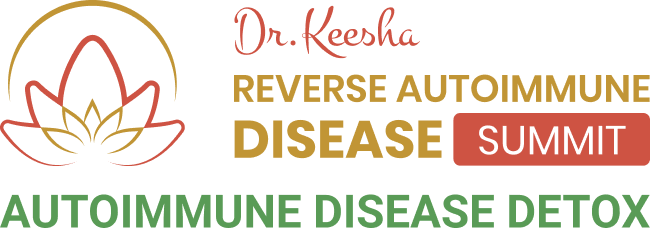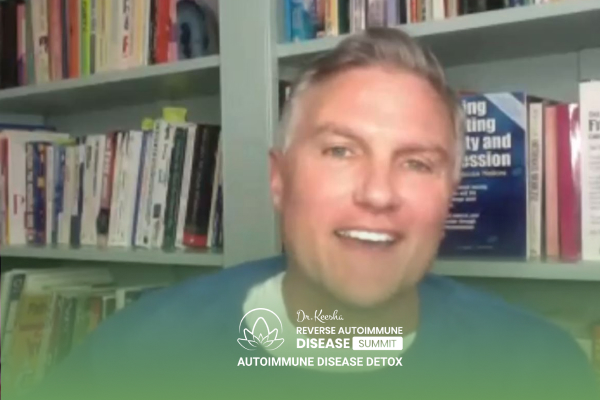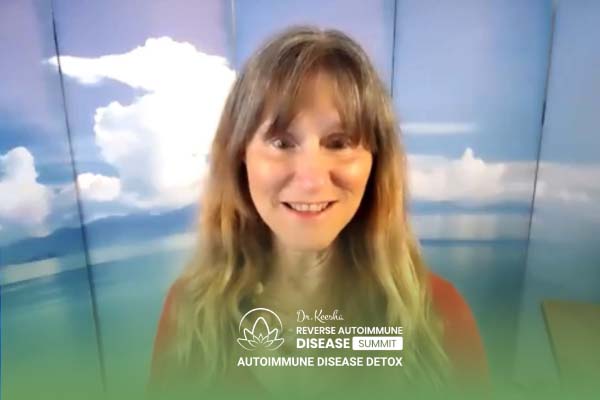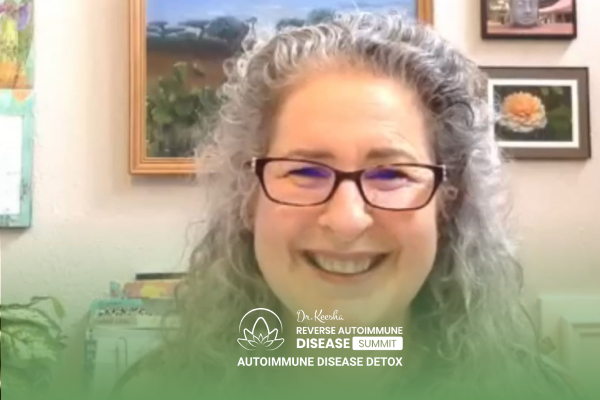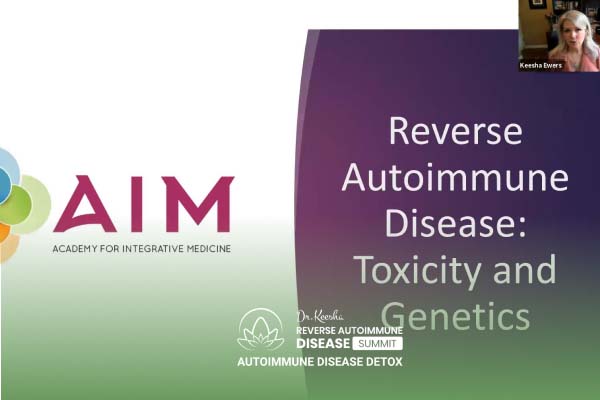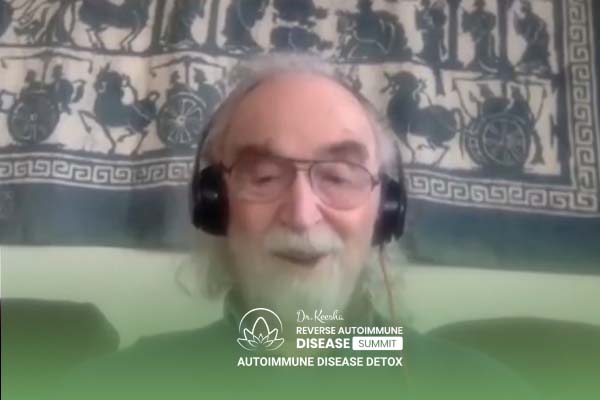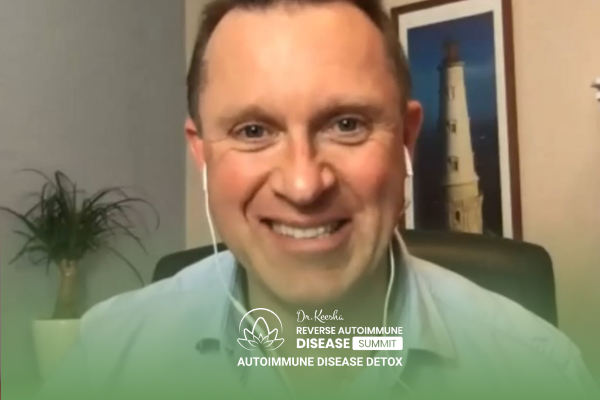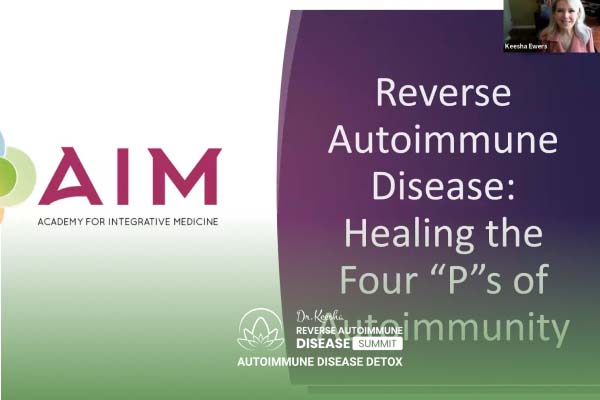Join the discussion below
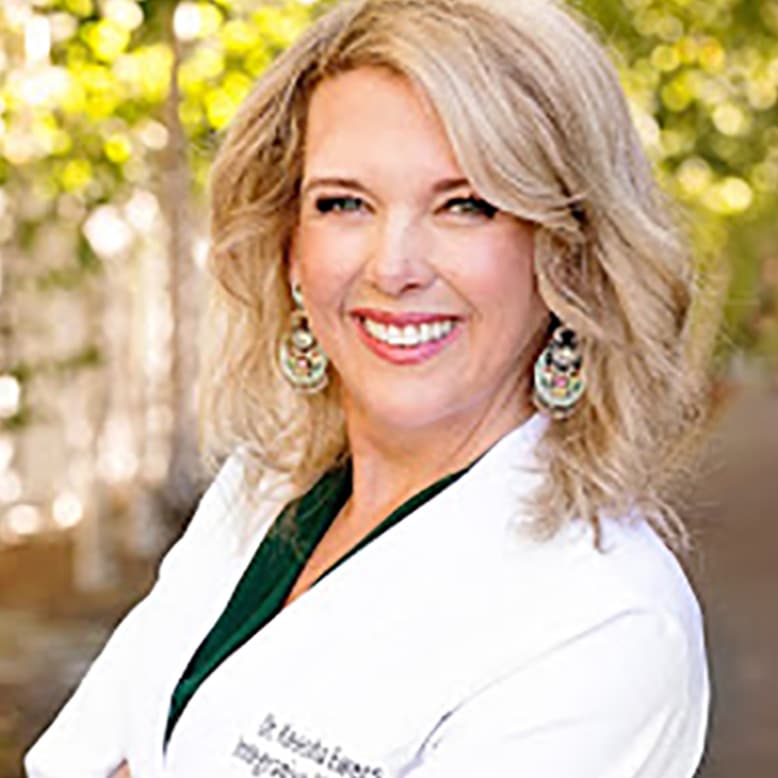
Keesha Ewers, PhD, ARNP-FNP-C, AAP, IFM-C
Dr. Keesha Ewers is an integrative medicine expert, Doctor of Sexology, Family Practice ARNP, Psychotherapist, herbalist, is board certified in functional medicine and Ayurvedic medicine, and is the founder and medical director of the Academy for Integrative Medicine Health Coach Certification Program. Dr. Keesha has been in the medical field... Read More
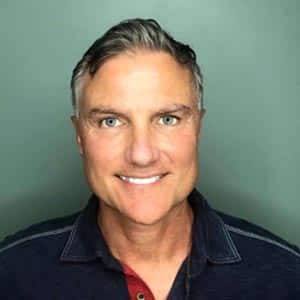
Dr. Rodger Murphree is a chiropractic physician and board certified nutritional specialist. He is an internationally recognized fibromyalgia expert. His “Murphree Method,” a combination of functional and orthomolecular medicine, has helped thousands of patients get healthy and feel good again. He’s the author of 3 books for patients and doctors including... Read More
- The best preventative medicine technique anyone can use to reduce their symptoms
- How to reduce your risk of heart attack, stroke, and weight gain by up to 40%
- What to do when anti-depressants stop working
Keesha Ewers, PhD, ARNP-FNP-C, AAP, IFM-C
Welcome back to the Reverse Autoimmune Disease Summit series, everyone. This is of course 4.0 or the Autoimmune Detox. I’m really delighted to bring in front of you a new friend and collaborator, Dr. Roger Murphree, who is a chiropractic physician and board certified nutritional specialist. He’s an internationally recognized fibromyalgia expert. His Murphree Method is a combination of functional and orthomolecular medicine and has helped thousands of patients get healthy and feel good again. He’s the author of three books for patients and doctors, including “Treating and Beating Fibromyalgia “and Chronic Fatigue Syndrome,” “Treating and Beating Anxiety and Depression “With Orthomolecular Medicine,” and “Heart Disease What Your Doctor Won’t Tell You.” Welcome to this series, Dr. Murphree.
Rodger H. Murphree, D.C., C.N.S.
Oh, so delighted to be here. I just think this is gonna be a lot of fun. I’ve heard so many wonderful things about you and your work. And what a great opportunity just to get a message that needs to be heard desperately.
Keesha Ewers, PhD, ARNP-FNP-C, AAP, IFM-C
It really does. And you know, and this particular, I always tell people this isn’t a straight line, this road to healing. It’s very tangled, you know, and interconnections and connecting dots and really individualizing to you. But there are some very solid pillars that we can look at. And I would love to first just start with: How did you get interested in this form of medicine? I haven’t met one person, including myself, who doesn’t have a personal story. And I would love to hear yours.
Rodger H. Murphree, D.C., C.N.S.
Well, you know, 30 years ago now, I mean I can’t believe it. I guess the gray hairs can show you that it’s been a while. You know, 30 years ago when I got out of chiropractic school and started practicing, I was content just to work on low back pain, herniated discs, migraine headaches, the things that a normal chiropractor would work on. But what I found is that my lifestyle started to bleed over into my practice. And my patients would ask me, “Well, you know, Doc, “how do you work all week and do triathlons on the weekend? “You know, you look so healthy. “What do you do to stay healthy?” And I just started sharing that information about diet and supplements and things that was working for me and my family. And I found, Keesha, that I really enjoyed that as much if not more so than the hands-on part of the practice. And little by little, my practice started to evolve more nutritionally to where I got interested in functional medicine. Now this was probably 25 years ago before that name functional medicine was ever a name.
Keesha Ewers, PhD, ARNP-FNP-C, AAP, IFM-C
When there were only 25 people in the room.
Rodger H. Murphree, D.C., C.N.S.
Maybe me and Dr. Bland and you’re right.
Keesha Ewers, PhD, ARNP-FNP-C, AAP, IFM-C
Same here.
Rodger H. Murphree, D.C., C.N.S.
And I hung on every word; still do, still do. You know, he’s brilliant. And the more I learned about all the things that going through chiropractic school and pre-med that I thought I will never use, I realized: Wow, this biochemistry stuff is fascinating. And I just started using that, the testing and the nutritional supplements with my patients nutritional protocols. And I found that I was getting these great results in all sorts of things. And then one day, now this was 20 years ago, So about five years went by and I got to be known kind of as the doctor for medical misfits. And in my community here in Birmingham, Alabama, I had done research work for the University of Alabama Birmingham, our Neurosurgery Department for a number of years.
And people would be referred to me who either just kind of it wasn’t a good fit, traditional medicine wasn’t a good fit for them or they had tried traditional medicine and it didn’t work. But one day, I had a patient that came to see me with fibromyalgia. Now this was 20 years ago, so a lot has changed in 20 years. A lot has not changed, unfortunately. But 20 years ago, I really had never even heard the term. And so when Sheila Jones came to my practice and she shared with me this list, this laundry list, of 30 different symptoms, my initial thought was she’s a hypochondriac. You know, what am I gonna tell her? But the more I got to know her and realized that she was telling the truth, I mean, why would she make this stuff up, and I set out using the functional medicine that both of us have learned. And I got great results with her. Her fibromyalgia went away in three months.
Keesha Ewers, PhD, ARNP-FNP-C, AAP, IFM-C
I wanna kind of .
Rodger H. Murphree, D.C., C.N.S.
Now wait a minute, let me back up.
Keesha Ewers, PhD, ARNP-FNP-C, AAP, IFM-C
No, I wanna talk because the part about your initial projection onto her like: Oh, she’s a hypochondriac. I kind of want people that are our viewers, you know, I have this huge autoimmune community. And I’ve really treated thousands of people with autoimmune disease through the years who have had that experience on the other side. And I remember doing that. When I was a 19-year-old nurse in the emergency department, the older nurses taught me this term, frequent flyer, you know, right, of patients that would come through with migraine headaches. And they would call ’em drug seekers, right.
It just makes me so sad, right, when I think about being a perpetrator of that kind of like assumptions about people who are having these experiences. And we now know that they are the sensitive ones. They’re the frogs in boiling water, right, the canary in the coal mine. And everyone else is kind of like, “What’s wrong with you?” And they can’t find anyone to listen to them. And I just want to acknowledge all of you that are listening that have had this experience that, you know, Dr. Murphree and myself have both been on the other side of and had those assumptions. And then whoops, you know, yeah, no, this is a thing.
Rodger H. Murphree, D.C., C.N.S.
It’s still all too common, you know, that you hear that this person is a hypochondriac, you know, and especially in the fibromyalgia community where, unfortunately, we still have doctors that don’t even believe in fibromyalgia. And you know, those that do don’t really understand it. And all they know to do is to tell their patients to learn to live with it.
Keesha Ewers, PhD, ARNP-FNP-C, AAP, IFM-C
Or give them an antidepressant.
Rodger H. Murphree, D.C., C.N.S.
Oh yeah, you got an antidepressant deficiency. You know, one in 10 females in the United States is on a antidepressant. Usually, that’s the visit, right. You go as a female,
Keesha Ewers, PhD, ARNP-FNP-C, AAP, IFM-C
That’s the gold standard.
Rodger H. Murphree, D.C., C.N.S.
Your doctor and they tell you at the end of the appointment, “Well, we just need to put you on an antidepressant,” or another antidepressant because oftentimes they’re already on one. Or they tell you that you’re just overweight or maybe, you know, you just need to get more sleep or maybe need to exercise, the things that, you know, are ridiculous. Because if you’ve got an autoimmune disease or something like fibromyalgia where you’re just exhausted all the time, you can’t exercise. You can barely get out of bed, right.
Keesha Ewers, PhD, ARNP-FNP-C, AAP, IFM-C
Right, right. And that’s still like, I was diagnosed with rheumatoid arthritis when I was 30. I’m 55 right now. So 25 years ago, I was given a prescription right off the bat for methotrexate and another for a nonsteroidal anti-inflammatory drug. And I was told, “Come back when you’re worse.” That was my dive into the other world, right. I was like: There has to be a different answer to this than this. And I never did take those medications, but it was, you know: When you’re worse, we’ll add to your medications.
Rodger H. Murphree, D.C., C.N.S.
Right.
Keesha Ewers, PhD, ARNP-FNP-C, AAP, IFM-C
Right. There’s no discussion involved, like why is this happening? I mean, my grandfather had it. So my doctor, she said, “Well this is obviously genetic.” So end of story, right. There’s no searching. And that’s still what’s happening today.
Rodger H. Murphree, D.C., C.N.S.
Well, you know, the medical model, the traditional medical model is really based on treating symptoms. And you know, there’s certainly a place for that. I mean, when you’ve got a raging bulging disc, you’ve thrown your back out, thank goodness for steroids.
Keesha Ewers, PhD, ARNP-FNP-C, AAP, IFM-C
If you’re having a heart attack, thank goodness for the emergency room. or a stroke. Yeah, there’s definitely a place for acute care like that. But we’re not talking about acute care.
Rodger H. Murphree, D.C., C.N.S.
Yeah, so we’re talking about chronic illness which I think, you know, we would both agree I’m sure that traditional medicine that’s where their weak link is. Because the chronic illnesses don’t respond to medication like an acute illness would. And unfortunately, it’s all about reducing the symptoms so the individual can live with it or the blood test looks normal. It’s not about fixing the cause, the underlying cause of the problem.
Keesha Ewers, PhD, ARNP-FNP-C, AAP, IFM-C
And we’re also talking about prevention and preventative medicine and our paradigm. Mammograms are called preventative medicine. That’s not a prevention; that’s a screening, right.
Rodger H. Murphree, D.C., C.N.S.
Right, right. Yeah, I find it comical when I’m talking to some of my patients and they tell me that they’re going to a preventative medical doctor. And what I find out that means is they’re getting screenings: basically cholesterol screening, mammogram, you know, these things that you know, they can be helpful, no doubt, no doubt. But preventative medicine is being proactive and taking charge of your own life. Either getting the information you need or using information that you’ve gathered to live a life that really fosters vitality and optimal health.
Keesha Ewers, PhD, ARNP-FNP-C, AAP, IFM-C
And what is one of the best preventative medicine measures out there?
Rodger H. Murphree, D.C., C.N.S.
I think a good night’s sleep. You know, I’ll tell you what, because I get asked this all the time. People know me as someone that deals with a lot of chronic cases, in particular fibromyalgia, which are really difficult. And they ask me: What’s the number one thing that they can do to feel better to reduce their symptoms? And the number one thing, doesn’t matter what your illness is, if you’re struggling with your sleep, either to fall asleep or to stay asleep or you’re not rested the next day, you’re not getting enough sleep, if you’ll focus on that, I guarantee you you’re gonna see that whatever the condition is, whatever the autoimmune condition: migraine headaches, weight gain, Type 2 diabetes, whatever it is, it’s going to improve. That’s how important deep restorative sleep is.
Keesha Ewers, PhD, ARNP-FNP-C, AAP, IFM-C
So let’s talk about deep restorative sleep. I had Lloyd Burrell on in an interview. And we were talking about EMFs, right? He’s thinking about it from the lens of EMFs as an exposure of a toxin that we are so unaware of and not maybe feeling directly, but how it’s impacting us. And I pointed out that, you know, the rings and the watches that people are going to bed with these days, I’m a little alarmed about that. It’s like that’s not giving your body enough time to restore itself and not have that exposure, right. So what’s the purpose of sleep? Like why do we talk about sleep? It seems like it’s such a like yawn, oh they’re gonna talk about sleep again or hydration or nutrition. You hear this all the time. But this is an important subject.
Rodger H. Murphree, D.C., C.N.S.
You know, I’ll put it right there sometimes with diet. ‘Cause you’ll hear people they’ll say, “Oh, you need to change your diet.” Which I mean, you really can’t be healthy unless you eat healthy. I mean, eventually it catches up with you. It may take 30 years, 40 years, whatever it is. So it’s definitely a cornerstone of being healthy is eating healthy. But that’s the long game. The short game though are things like if you’re exhausted but you get a good night’s sleep, the next day you’re gonna feel better. It’s that quick. And we know that when you’re getting that deep restorative sleep, this delta sleep, that’s when the body is repairing itself. So the cells are being repaired, muscles, tendons, ligaments. Your brain is detoxifying toxins.
That’s one of the only ways it can do that. It’s when you go and lay down and actually rest, that’s when the body goes to work really. We think that you’re just laying there like a knocked out zombie. But if you look at brain scans, you’ll see that the brain is incredibly active during the night. And a big part of that is because it’s getting all this junk out of the brain and healing the body. And if it doesn’t have the opportunity to do that, what we see is that poor health is, it’s, you know, hitched to that. I mean, if you’re not getting good, consistent, deep restorative sleep, your inflammatory chemicals go up by 40%. If you’re not getting deep restorative sleep, your increased risk of heart attack, stroke, weight gain, problems with your thyroid, anxiety, depression, irritable bowel, restless leg syndrome. And then obviously, if you’re not getting a good night’s sleep, you’re gonna be tired the next day. And if you do this night after night, week after week, month after month, year after year, eventually you’re just burned out and exhausted. And the body, you know, it’s gonna be sick. There’s no way around it.
Keesha Ewers, PhD, ARNP-FNP-C, AAP, IFM-C
I know that I was one of those very, I still am but it’s not as good, but I was one of those very fortunate people who are I would be asleep before my head hit the pillow. You know, it was like I put the intention towards sleep at night and I would go out. And then wake up the next day at five o’clock in the morning and go start training for the next marathon. You know, just go for a run, I had so much energy. And then I got RA, and then I was able to reverse it within six months. And then I was able to do that same thing again. And then I went through menopause last year. And that, really I have to be very careful now about nurturing everything so I sleep well. You know, it made it a little bit more tenuous. And so what are some of those root causes that you run into for people getting that deep restorative sleep?
Rodger H. Murphree, D.C., C.N.S.
I think in the fibromyalgia community, what happens is it’s just, you know, it’s stress. And if you were to poll most healthcare professionals, they would tell you that stress is the catalyst for probably 90% of all illnesses. And it certainly is for fibromyalgia. And it can be it can be a short term stressor, something that happens like a surgery that they don’t recover from. It can be the loss of a loved one. But typically, it’s chronic stress that eventually catches up with them. And in the fibromyalgia community, which I think also we see this in autoimmunity conditions as well, is that oftentimes they have a difficult childhood. And that could be sexual abuse, verbal abuse. It could be an illness. It could be just, you know, a difficult time that they go through as an adolescent or a youngster and they lose their plasticity to stress.
So that when they become a young adult, something comes along that’s the straw that breaks the camel’s back and they’re not able to rebound from it. And that can be years of being in a toxic marriage or a toxic work environment. It could be they’re a caregiver of an elderly parent or maybe a a disabled child, you know, a special needs child. And that individual maybe, you know, passes on. And then, now they’re just that’s it, they’re done. And the first thing, the first thing if you ask most people if they think back: What really started their illness? You’ll hear this time and time again, they started to really struggle with their sleep. That could be because they were in pain. That could be because they had stress. They couldn’t turn their mind off, whatever it is. But you see that oftentimes, it’s that their sleep becomes compromised. And when that happens, if they don’t fix that, then they’re susceptible to all these other problems.
And a big part of that is, and I use this analogy if you’ll bear with me. People get a visual of this. But we’re all born with a stress-coping savings account. And in this stress-coping savings account, we have certain chemicals: hormones, vitamins that we need to allow us to be able to deal with stress. Anytime we’re under stress, we would make withdrawals of these stress-coping chemicals and we use them to counter traffic jams, loud noises, bright lights, you know, all these things that happen to us that are stressful, but we can deal with it. But once you start to make more withdrawals than you do deposits, now you start to see the ill effects of not getting enough sleep.
Because you make deposits into your stress-coping savings account when you go into deep restorative sleep. And one of the key stress-coping chemicals that I see in my patients that they deplete is the brain chemical serotonin. And serotonin is, as you know, it’s the happy hormone. So when that hormone becomes deficient because you’re not getting enough sleep, by getting enough rest, now what you see is your pain threshold goes down. The lower your serotonin level, the lower your pain threshold. So pain becomes more magnified. Fibromyalgia. The lower your serotonin level, the more likely you are to be anxious, to be depressed, and to have mental clarity issues. And the more likely you are to have problems with irritable bowel.
Because you have more serotonin receptors in your intestinal tract than you do in your brain. So when you get nervous, you get butterflies in your stomach. But once that serotonin level is depleted, once you’ve depleted and oftentimes bankrupted your stress-coping chemicals, you don’t have these chemicals and hormones to be able to deal with stress. So now, stress becomes more magnified. So it’s a vicious cycle. You’ve got you don’t have the chemicals to deal with the stress. So you feel more stressed out which creates more stress which creates more stress. And it’s this vicious cycle that people get in that they can’t get out of. And there’s no medication that can solve that.
Keesha Ewers, PhD, ARNP-FNP-C, AAP, IFM-C
Well, this is why serotonin re-uptake can happen, right. Antidepressants are prescribed to that community by Western medicine is because they took, you know, always in science, the way that we do it in the West is we take that one operating chemical. We don’t look at it as a synergistic whole, right. Say, “Oh, here’s the thing that’s actually happening. “So let’s give that, right.” And of course, then over time that messes everything up because serotonin and dopamine share the same synaptic surface, right. And then of course, libido goes away. And then a woman will show up in the office and say, “Well, now I’m even more depressed. “I don’t have any libido; my marriage is being affected.” So what’s the solution to that?
Rodger H. Murphree, D.C., C.N.S.
Well, you know, first of all, no one has a Prozac deficiency, right. So it’s not that you have an antidepressant deficiency. And we need to keep in mind that if you look at a meta analysis, which is if you look at all the studies or a number studies, hundreds of studies that are out there about antidepressants, if you look at those studies, 70% of the time, a sugar pill, a placebo, is just as effective as the antidepressant. And then we also need to realize too that.
Keesha Ewers, PhD, ARNP-FNP-C, AAP, IFM-C
“But I tell you my story “So when you listen to me “and you’ve given me a prescription, you care. “Oh, it must work.”
Rodger H. Murphree, D.C., C.N.S.
Yeah, yeah, yeah. And, you know, the thing about these medications is they don’t make serotonin, you know. A selective serotonin re-uptake inhibitor is supposed to help your brain, help the cells to re-uptake serotonin so you can get more mileage out of it. And so, it’s kinda like using a gasoline additive in a gasoline tank. It helps the gasoline be more effective. The problem is, Keesha, if you’ve had years and years of stress and you’re run down, you’re not sleeping, you’re just exhausted, you don’t have any serotonin to re-uptake. There’s nothing there. It’s kinda like using a gasoline additive in an empty gasoline tank. And this is why people will get on an antidepressant and maybe initially, it could be a year, it could be 18 months, whatever it is, maybe they do tell a difference. They feel better. But eventually, it quits working. And so then they switch to another anti-depressant and another.
So it’s not that you have an anti-depressant deficiency. But you could have an amino acid called tryptophan or a 5-hydroxytryptophan deficiency. Or you could and probably do, because most people do, have some type of vitamin deficiency, one or sometimes often more than one of the key synergistic vitamins needed to combine with this amino acid to make serotonin. So, you know, if you’re not getting enough B6, maybe genetically you can’t convert pyridoxine, which you’d get in your diet, into P5P. So you’d never get enough B6. Or maybe you’re not getting enough B12 because you’re taking a proton pump inhibitor or something to squash your stomach acid ’cause they told you you had too much stomach acid when really you don’t have enough. So, you know, you quickly can become depleted in these synergistic vitamins. And then before you know it, yeah, you do. You have a serotonin deficiency and you’re depressed.
Keesha Ewers, PhD, ARNP-FNP-C, AAP, IFM-C
Yeah, yeah. And then you take the antidepressant and you have no libido.
Rodger H. Murphree, D.C., C.N.S.
Well, ironically, if you look at the potential side effects of the antidepressants, ironically, one of those is depression. The other one is anxiety. And then antidepressants, including the older antidepressants, tricyclic antidepressants like Trazodone and Pamelor and some of these others as well as the newer ones: Cymbalta, Effexor, Celexa, these, they actually deplete your natural sleep hormone melatonin. So they start to compromise your sleep. And again, going back to what I just shared earlier, if you’re not getting that deep restorative sleep, that to me is the quickest way you deplete serotonin. Because the body can’t keep up with the demands of the stress.
Keesha Ewers, PhD, ARNP-FNP-C, AAP, IFM-C
And the decreased melatonin affects your immune system.
Rodger H. Murphree, D.C., C.N.S.
Yeah, you know, I’m a big fan of melatonin. I think it can be very very helpful. It’s a potent antioxidant. It’s one of the few things that, you know, you can take and get past the blood brain barrier. So it’s an incredible detoxer for the brain. It really can be helpful. It helps your immune system. But for my patients, I find that they not so much have, although they certainly can have a melatonin deficiency, but they have the serotonin deficiency. And, you know, 5-hydroxytryptophan which you can buy over the counter, that amino acid, that increases your natural sleep hormone melatonin by 200%. And at the same time, if needed, if you need this, it’s increasing your serotonin. It’s giving you the serotonin that your body needs to reduce pain and help with anxiety and depression and all the other things that we talked about earlier.
Keesha Ewers, PhD, ARNP-FNP-C, AAP, IFM-C
And I do wanna say that the part that you said in there about if you need this, you know, I always teach my health coach students: Test, don’t guess. And I’m going to say that to our viewers too. People will read an interesting article, a blog. They’ll hear a talk like this and say, “Ooh, I should go try that.” You know, it really is if you need it. Because we’re talking about neurotransmitters in the brain that very finite amounts will affect a bunch of others. You know, there are all these feedback loops that are dependent and interrelated. And so, it’s really good to know what you as an individual require instead of, “Oh, this is a super hormone; I need to take it.”
Rodger H. Murphree, D.C., C.N.S.
Yeah, yeah, yeah. And so on my website, I’ve developed this little simple little survey that people can take. It’s called the Brain Function Questionnaire. And it’ll tell them, it’s pretty accurate. Used it for about 20 years. I developed it when I wrote a book on anxiety and depression and did the research on that. But it’ll tell you if you’re deficient in certain amino acids. And certainly though, there’s testing with it. It’s a blood test or a urine test that will show you if you’re deficient in these amino acids and/or these neuro-transmitters. Absolutely.
Keesha Ewers, PhD, ARNP-FNP-C, AAP, IFM-C
Yeah. So now, now we have some root causes including trauma. And that’s one of the things that I find is a missing piece in the puzzle for most people with autoimmunity. And it’s not necessarily, I mean I have sexual abuse in my past. And when I was reversing my own RA, I learned to meditate and I went backwards to say like: why? If I have autoimmunity, that means I’m killing myself. Why?
Rodger H. Murphree, D.C., C.N.S.
Yeah.
Keesha Ewers, PhD, ARNP-FNP-C, AAP, IFM-C
When did I start that? And I went backwards in my memory and went: Oh, that 10-year-old girl, she did wanna die. And that probably informed that cellular function of the 30-year-old version. And we do know, science tells us it takes anywhere from 10 to 30 years to develop a full blown autoimmune disease. So when you say, you know, stress and trauma patterns, you know, I just am so happy you said that because it’s a big thing that I’m always teaching people. Yeah, a lot of people have gone to a lot of functional medicine providers, spent thousands of dollars on supplements and dietary protocols and lab testing. But at the end of the day, they haven’t gotten underneath the way that their nervous system responds to the experiences they’re having in their lives. And then that of course impacts sleep.
Rodger H. Murphree, D.C., C.N.S.
Well ultimately, health comes from within. So you certainly can get some help, but you know, our healing comes from within. And there’s, you know, different factions of that. But we’re all born with, as self-healing dynamos, this innate healing ability that God or the universe has given us. And part of the challenge for many people is, as you just mentioned about autoimmune is, they’re their own worst enemies because they keep things so bottled in from past events. They never acknowledge that. And I think that’s kind of how society it’s taught us to be that way. It’s not to get to know yourself. It’s all about everything that’s outside. It’s not about what’s inside. Fortunately, we’re learning, it’s been there so people are getting a little more open-minded to it, that one of the most powerful things you can do to be healthy mentally, physically, spiritually, just in life is get to know yourself. And the only way to get to do that is to quiet everything down and spend some time alone with yourself and get to know what are these emotions? What’s driving these emotions? Where are they coming from? Acknowledging, you know, knowledging them, and then hopefully letting them go. Just let ’em go.
Keesha Ewers, PhD, ARNP-FNP-C, AAP, IFM-C
Yeah. You know, probably in your practice, you have primarily women with fibromyalgia?
Rodger H. Murphree, D.C., C.N.S.
Well, so fibromyalgia is, and probably should have clarified this, fibromyalgia is an illness that affects women primarily. 98% of them are women between the age of 40 and say 67. And it affects about 8% to 10% of the world population. And it’s made up of a group of symptoms. , sometimes disabling pain, low energy, incredibly low energy, fatigue, irritable bowel, poor sleep obviously is a big one, low moods, restless leg syndrome. There’s a group of symptoms. And we call these common symptoms that people have, we give it a name called fibromyalgia. But, you know, fibromyalgia is just a name. It doesn’t cause the pain. Like rheumatoid is just a name to describe that your body’s attacking the joints, but rheumatoid doesn’t cause it. So with autoimmune, as you mentioned, we’re looking at or we should be asking: Why is the body attacking itself?
Keesha Ewers, PhD, ARNP-FNP-C, AAP, IFM-C
Right.
Rodger H. Murphree, D.C., C.N.S.
And why is that?
Keesha Ewers, PhD, ARNP-FNP-C, AAP, IFM-C
Where I was going with this is 80% of autoimmune diseases are also diagnosed in women. And you know, this piece around the trauma component affecting everything. I sat with that years ago and thought: Why are 80% of autoimmune disease in women? And there is some research that shows well we have more estrogen receptors. You know, there’s definitely those pieces. But I started noticing a pattern in my own clients you know, of people pleasing, people pleasing women; and perfectionists of which I was both of those. And then, women that have been holding onto the poison of past pain. And I started thinking about that, like why we are more Velcro in our minds when you say, “Just let it go.” I’m like: Yeah, females have a harder time with that. And I wondered about that a long time ago. And I realized: Well, we’re the ones in the tribal times that were, you know, we’re grinding the corn, we’re tanning the hides, we’re exchanging information through storytelling.
And we’re trying to keep the toddlers out of the fire pit, you know, so that they don’t get burned. And so we’re multi-taskers. We have a different corpus callosum. You know, we have this: Oh, so we actually have to remember the berries that are poisonous, where the saber tooth tiger came out of the forest, you know, so that we’re keeping our people safe in the way that we do it, in that nurturing way, and holding the wisdom. And I thought, yeah. So when we’re hurt, we hold onto that. Like that was painful; we don’t wanna forget that. And that can be beneficial for the reasons I just mentioned. But then it can also cause disease if you can’t do what you were just talking about. And what I learned really early in my process was about Ayurvedic medicine. I went and I did some research. And I thought: There’s gotta be a different way of doing this than methotrexate. And lo and behold, Ayurvedic medicine 10,000 years ago said autoimmune disease is undigested anger.
Rodger H. Murphree, D.C., C.N.S.
Interesting, yeah, fascinating.
Keesha Ewers, PhD, ARNP-FNP-C, AAP, IFM-C
So interesting. Because I didn’t consider myself an angry person. And then when I sat with that, I thought: Yeah, maybe that’s the problem. Not permissioning myself ’cause I’m such a people pleaser and I’m a perfectionist, I wanna do everything right. So there’s not a space in there for even witnessing and having permission to have that emotion, let alone letting it go, right. Yeah, so I was thinking you probably see this with your client base too.
Rodger H. Murphree, D.C., C.N.S.
Well, so in the fibromyalgia community, I really see the type A’s and the type B’s. So the type A’s are the doers, right. And these are the soccer moms and they work, you know full-time. Maybe they work 40, 60 hours a week. But they do everything for the family and they maybe volunteer for the PTA and . They’re the doers.
Keesha Ewers, PhD, ARNP-FNP-C, AAP, IFM-C
I always say they’re bringing home the bacon, they’re frying it up in the pan, and they’re trying to look hot at the same time. It’s that one, right.
Rodger H. Murphree, D.C., C.N.S.
You know, but for these individuals, they do and they do and they do and they do and they do and they do. But then one day, Keesha, they’re just done. That’s it, they’re done; they’re done out. And then the other, the type B’s, are the caregivers. So I have a lot of nurses. I mean, a lot of nurses and doctors, some doctors as well over the years, but a lot of nurses, a lot of healthcare. But you don’t have to be a professional caregiver to be the one that everybody maybe in your family turns to. But these individuals, they give and they give and they give and they give and they give and they give. And then one day, they’re just given out and that’s it. They’ve bankrupted their stress-coping chemicals and that’s it; they’re done. And so we can call it, you know, we can call it, you know, psoriatic arthritis, you know, an autoimmune disease or fibromyalgia or whatever it is. But what’s happened is they’ve just given or done everything they could, and that’s it. They’ve depleted everything they’ve got. And then they start to see that the disease symptoms start to show up.
Keesha Ewers, PhD, ARNP-FNP-C, AAP, IFM-C
And oftentimes, the trauma in their background and the meaning they attach to it and the adaptive behavior from that trauma are what put them on the path to being a doer and a giver. So I always say this isn’t about willpower. You know, it’s not about changing your mind up in the prefrontal cortex of the adult brain. It’s about really healing this little one back there that said: “I have to actually care for everyone else “in order to be worthwhile and deserving “for any kind of love to come my way.” You know? “And I’m not gonna put myself at the top “of the to-do list because I have to get all this stuff done “in order to feel worthy and deserving “of a breath of life itself.”
You know? And that little kid is the one that made that decision for whatever reason, right, who didn’t have a prefrontal cortex yet, right. That little kid was operating out of a child brain which is the same thing as our little primal brain that’s looking around to say: “How do I become an adult? “You know, how do I fit in?” How do I, right? And so, that hyper-vigilance is the thing that can keep you awake at night if your strategy of caring for everyone or doing everything is starting to fall apart. And believe you me, eventually it will. Not a tenable way of living life, is it?
Rodger H. Murphree, D.C., C.N.S.
Yeah, you’re absolutely so correct. And of course, you know, women are, you know, they’re the healthcare givers. I mean, they’re the ones that make all the healthcare decisions in a family typically. And, you know, that’s just kind of a role that we just expect of women. Whether that’s right or not or by nature, I’m not really sure of genetically. But it’s just kind of a given that that’s how it is. And there’s probably some major problems with that.
Keesha Ewers, PhD, ARNP-FNP-C, AAP, IFM-C
Yeah, well, we’re the nurturers, you know. We’re endowed with those extra estrogen receptors.
Rodger H. Murphree, D.C., C.N.S.
Yeah.
Keesha Ewers, PhD, ARNP-FNP-C, AAP, IFM-C
Right.
Rodger H. Murphree, D.C., C.N.S.
Absolutely.
Keesha Ewers, PhD, ARNP-FNP-C, AAP, IFM-C
And so, it’s really important to start to turn that nurturing toward here. Because like they say in the airplane, if you don’t have enough oxygen for yourself, you’re not gonna have any to give to another person. So I love that you mentioned that when I said so what’s the root cause for not sleeping well, and you said trauma, right. And it’s this kind of stuff that keeps that hamster on the wheel and makes it so that you can’t go to sleep. And healing that’s so important, so important. Yeah.
Rodger H. Murphree, D.C., C.N.S.
Yeah, I think you used the analogy earlier about the frog in the boiling water. I think that’s so, you know, such a a visual that you can get that most people kind of just go through life. And they get some aches and some pains and maybe they start having some digestive issues.
Rodger H. Murphree, D.C., C.N.S.
Yeah, they just put up with it. And pretty soon, a decade goes by. Now they can’t exercise anymore. They can’t do a lot of things that they used to be able to do ’cause now their health has become so compromised. And then when they finally wake up and try to do something about it, you know, they’re oftentimes middle-aged. They don’t take responsibility. “Hey, you know, I’m helping everybody else. “I need to take care of myself.” With a frog, if you were to dump ’em in a boiling pan of water, they’re gonna hop out quickly. But if you put ’em in tepid water and you slowly turn it up, over a period of time, they’ll boil.
It’ll kill ’em because they don’t know any better. And I think that’s kind of what I see in my practice is that the women that I work with they are so busy trying to take care of their family and everybody else but themselves that they put up with it. And it becomes the norm that if they go to their son’s ball game, you know, then they’re in bed for two days. Or just things that you and I would never think of as that’s the norm, people get so conditioned that that’s just the way it is. That’s how it is for me. It doesn’t have to be that way.
Keesha Ewers, PhD, ARNP-FNP-C, AAP, IFM-C
No, it doesn’t. And I think this is a really important conversation to have. Because actually, and I’m speaking to the women who this resonates with, you trained everyone around you to expect what they expect from you at this point. By the time you reach middle age, you’ve trained your spouse, you’ve trained your children, you’ve trained your friends, you’ve trained your coworkers to expect you to be that doer or giver, you know, at the level that you’re at. And there’s resentment that will come up about that and frustration. “How come people are always doing this to me?” But actually, you trained them to be like that, you know? And it’s, you can retrain them. They don’t like it. I remember when I had to, no one liked it. But then, you get a new normal where you’re included in the caregiving in the family rather than in charge of it.
Rodger H. Murphree, D.C., C.N.S.
Yeah, my wife’s still training me.
Keesha Ewers, PhD, ARNP-FNP-C, AAP, IFM-C
Yeah?
Rodger H. Murphree, D.C., C.N.S.
I don’t think there’s any hope.
Keesha Ewers, PhD, ARNP-FNP-C, AAP, IFM-C
No, there is if she really has the goods. “No, no, that’s not gonna work for me anymore. “Let’s talk about a different way of doing things, right.”
Rodger H. Murphree, D.C., C.N.S.
Yeah, absolutely.
Keesha Ewers, PhD, ARNP-FNP-C, AAP, IFM-C
She loves you and they may gripe. But they’ll, you know, when you really hold a strong enough boundary. “This is making me sick. “I cannot do this. “So this is what I’m proposing. “How about if we do it this way and try it?” And that’s kinda how I did it where we just kept adjusting, kept adjusting. And then finally, I had the life that I needed to have to get better in. I think that’s important too for people to understand that they’re actually the ones that created the monsters around them.
Rodger H. Murphree, D.C., C.N.S.
Yeah, I know. Yeah, I totally would agree with that. We’ve got a couple of monsters running around the house today too.
Keesha Ewers, PhD, ARNP-FNP-C, AAP, IFM-C
When I have a mom sitting in front of me that says, “My kids are so entitled,” I say: It was interesting when I woke up to that with my own and went ooh. But that only came from here. So we can change that. And there will be years of resistance along the way, but you can change it so it’s important to do. So what are some strategies that our viewers can utilize for making sure they have deep restorative sleep?
Rodger H. Murphree, D.C., C.N.S.
Well, you know, so it’s important to point out that this is one component of a multifaceted approach that I use for fibromyalgia and autoimmune disease. But I do put such a heavy emphasis on sleep. I really believe if you don’t get that right, everything else is gonna be a struggle. And for fibromyalgia, it’s really a struggle of literally being in quicksand and not being able to get out. With deep restorative sleep, I think the keys are, and you mentioned them earlier, a big part of that is sleep hygiene. So I think it’s important to put the emphasis, you know, put the importance that you really do need to get that rest. So I see a lot of my patients, a lot of my clients, they have gotten to where they kind of catch their second wind at bedtime.
So they may be tired all day, and then they catch their second wind because nine p.m., that’s when the kids go to bed. So now they’ve got some time to themselves. And then they start to do things around the house that maybe they hadn’t gotten done during the day. And before you know it, they’ve missed that window of opportunity between say 10 p.m. and midnight when they should be getting in bed and falling asleep. If you miss that window, your cortisol level spikes up, squashes your sleep hormone melatonin. So one of the most important things you can do is to prepare. And that is two to three hours before bed, make sure that you’re taking the steps needed to wind down. And that’s dimming the lights. Good gracious, you know, don’t watch the news. That’s the most toxic thing you can do. The worst thing you can do is watch the nightly news before you go to bed. Or even worse than that, lying in bed on your iPad looking at the news. That is a recipe for insomnia if ever there was one.
Keesha Ewers, PhD, ARNP-FNP-C, AAP, IFM-C
Or going back and forth in the news and answering your emails, and getting going on tomorrow’s work, right.
Rodger H. Murphree, D.C., C.N.S.
The bedroom is for intimacy and for relaxation, to read, to rest, no TVs. You shouldn’t have your office in there. You shouldn’t have your computers in there. Your phone should not be there in your bedroom. If you have to have an alarm clock, get an alarm clock. But get your phone out of there. Turn your wifi off at night. Some individuals are really sensitive to wifi, you know, to electromagnetic fields. So anything that’s giving off an electromagnetic field, even AC currents, electric blankets even. Some people are really susceptible. But really paying attention to what you can do to wind down an hour or two before bed. And then when you get into bed, it’s really again for intimacy. If you wanna read, I don’t really like my patients to use a tablet. If they do use a tablet, there’s apps they can put on there to block the light. So I recommend they do that. The, the
Keesha Ewers, PhD, ARNP-FNP-C, AAP, IFM-C
Blue light.
Rodger H. Murphree, D.C., C.N.S.
Blue light blinds, thank you, that you put on, I think they look silly, I know they do. But you can block out that light. Because it doesn’t take 30 Watts or some small number, 20 Watts, it’s like a very small amount that if you’re exposed to that light, a nightlight even, when that hits your eyes, you know, hits your pupil or it goes to the pineal gland, it just squashes your melatonin level. So block-out blinds, you know, totally darkened bedroom. And then the temperature should be somewhere around 68 degrees. It should be cool. We know that that temperature is ideal for the body being able to just kind of relax and wind down and be able to get into that first phase of sleep, that alpha phase where you’re just really kind of getting those beta waves and alpha waves going that really can allow you to wind down and relax and then get on into the deeper delta wave sleep.
Keesha Ewers, PhD, ARNP-FNP-C, AAP, IFM-C
I’ll tell you, ever since last year with hormonal changes, I think my bedroom, it was 33 here in Seattle yesterday. And my windows are still thrown open. The colder the better in my bedroom. And my husband’s over there with like four blankets on him. But I sleep really well now.
Rodger H. Murphree, D.C., C.N.S.
Yeah, so that’s another thing that sort of like can compromise your sleep is perimenopause and menopausal issues for sure. Yeah.
Keesha Ewers, PhD, ARNP-FNP-C, AAP, IFM-C
Yeah, so making sure you’re getting your adrenals and your hormones tested and your metabolites and really making sure that your liver is doing a good job in the middle of the night when it’s dumping. And not having any barriers in your lymphatic system. You know, all of those things so important.
Rodger H. Murphree, D.C., C.N.S.
Yeah, and there’s a lot to it. And so people are gonna watch your summit. And they’re gonna love it I know. And there’s just so much information. There’s so much information when you attend a summit. First of all, for those of you watching this, I applaud you for being proactive. But the second thing I would say, although you didn’t ask me to give my advice, but I would say, you know, take it in chunks. Don’t let it be overwhelming. You know, there’s just simple things that you can take from this summit or other summits, and you can take that and apply it. Don’t let it be overwhelming.
A lot of this stuff will probably come in and go over your head and, you know, it won’t resonate with you. And that’s one reason why I always, every time I appear I always encourage the viewers to purchase the summit. Not to sell the summit, you know, but it’s because you’re gonna wanna come back and watch it over and over again. It’s like reading a complex book. I know for me, I can go back and read a book by Wayne Dyer, one of my mentors, or Deepak or Earl Nightingale. I mean, some of these people, I can go back a year or two later and I can revisit that material and there it is. I’d been searching for that answer for two or three years and there it is. I’ve read that book two or three times and it’s aha. There it is; there’s the answer. So don’t be overwhelmed. Know that you can take little steps that can have a big impact in your health. And sleep.
Keesha Ewers, PhD, ARNP-FNP-C, AAP, IFM-C
Sleep, please. I call overwhelmed the gateway drug to perfectionism. So if you’re overwhelmed, you know that it’s because that you’re in that perfectionistic space. And you’re not gonna get better, you know, in that space. And so taking it in chunks, like you just said, or saying, “Okay well, for this next month, “I’m gonna work on sleep and increasing my sleep hygiene “and doing these different things “and trying it out, getting some glasses, “maybe some blackout curtains.” Each week like one little thing.
Rodger H. Murphree, D.C., C.N.S.
Yeah, yeah.
Keesha Ewers, PhD, ARNP-FNP-C, AAP, IFM-C
“And I’ll do EMFs. “And I’ll do what Lloyd said.” And I’ll, you know, just take it a chunk at a time. Otherwise, when you do get into that overwhelmed space, what are you doing to your nervous system? Making you sick.
Rodger H. Murphree, D.C., C.N.S.
Right, that’s right.
Keesha Ewers, PhD, ARNP-FNP-C, AAP, IFM-C
Well, I just really appreciate you, Dr. Murphree, for coming on. Is there anything that we haven’t talked about that we should that you want people to know?
Rodger H. Murphree, D.C., C.N.S.
Well, I think anytime I talk about autoimmune disease, I always kind of wanna make sure that this comes up, and it did earlier, but I just wanna put some emphasis on this. With autoimmune disease, the body is erroneously attacking itself. And if you think about that, then the question has to be why. So what I wanna encourage everybody wanting to do is to take this information that is being shared here today and then in this summit and think about some of the things that have come up with some of the presentations and think about what could be some of the causes, the underlying causes, that are generating your symptoms. So pain is just a symptom. That’s all it is. You know, if you’re broken out in psoriasis, that’s a symptom. That’s not the disease itself. It’s a symptom that something is wrong.
Either you’re getting too much of a toxin You know, you’re taking in toxins, too many toxins. Or you’re eating something that’s not agreeing with you. Or maybe you’re not getting enough nutrients. But something is causing the body not to work like it’s supposed to. And I wanna encourage you to think about it that way rather than: I need a drug to treat the symptom. And there’s a place for that, no doubt. I mean, there’s definitely places. There’s a time, there’s a place. But start thinking like a detective. What is it that could be causing this underlying symptom? And then people like Dr. Keesha here and other functional medicine practitioners, they can help you in that quest to find what are the underlying causes and not just treat the symptoms.
Keesha Ewers, PhD, ARNP-FNP-C, AAP, IFM-C
That’s really, really beautiful advice. And it’s definitely what helped me reverse my own was realizing like: Oh, I’m doing this to me. So why, not how do I get out of my suffering. How came later after the why was discovered. And I think that’s really important, that order. So thank you for highlighting that. I know that you have a gift for our viewers, “The Importance of Deep Restorative Sleep “in Autoimmune Disease,” yeah?
Rodger H. Murphree, D.C., C.N.S.
Yeah, so I was happy to supply that. So you should have that. And that’s a sleep training program. So it will help you to go through the natural protocols and the sleep hygienes and the supplements and everything, not everything we’ve talked about, but much more in there. So hopefully, you’ll take advantage of that and learn what you can do to make sure you’re optimizing your sleep every night.
Keesha Ewers, PhD, ARNP-FNP-C, AAP, IFM-C
And we’ll have Dr. Murphree connecting information too with his talk. So once again, thank you so much for spending the time with this community and sharing your wisdom.
Rodger H. Murphree, D.C., C.N.S.
Well, you’re a delight. And so, I was so happy to get an opportunity to spend some time with you and your audience. And look forward to our paths crossing again. And excited to be a part of what I really believe is something that’s desperately needed. There’s just such a void, a wasteland out there for individuals with autoimmune disease. And this is gonna definitely fill that void. So I’m so excited to be a part of it.
Keesha Ewers, PhD, ARNP-FNP-C, AAP, IFM-C
Thank you. All right everybody, until next time be well.
Downloads
